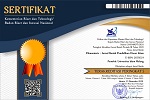PENGARUH MODEL COOPERATIVE PROBLEM SOLVING TERHADAP KEMAMPUAN PEMAHAMAN KONSEP IPA SISWA SEKOLAH DASAR
DOI:
https://doi.org/10.33474/elementeris.v5i2.15865Abstract
Penelitian ini bertujuan untuk menganalisis pengaruh penggunaan model pembelajaran Cooperative Problem Solving terhadap pemahaman konsep IPA Materi Organ dan Sistem Peredaran Darah Manusia siswa kelas V. Penelitian ini dilaksanakan di SD Negeri 06 Mensere. Jenis penelitian yang digunakan yaitu penelitian kuantitatif dengan metode quasi exsperimental design, dengan bentuk desain nonequivalent control group design. Populasi dalam penelitian ini adalah seluruh kelas V SD Negeri 06 Mensere yang berjumlah 50 siswa. Penelitian ini menggunakan teknik sampling jenuh yakni semua anggota populasi digunakan sebagai sampel. Setelah pengambilan sampel yang terpilih menjadi kelas eksperimen kelas VA yaitu kelas eksperimen yang menggunakan model pembelajaran Cooperative Problem Solving dan kelas VB kelas kontrol yang menggunakan model pembelajaran langsung. Teknik analisis data yang digunakan adalah uji t-test dua sampel dan effect size. Hasil penelitian menunjukkan bahwa Terdapat pengaruh model Cooperative Problem Solving terhadap kemampuan pemahaman konsep IPA siswa dengan rumus effect size dengan nilai 1,38. Artinya bahwa penggunaan model Cooperative Problem Solving dapat meningkatkan kemampuan pemahaman konsep IPA.
Kata kunci: Cooperative Problem Solving, Kemampuan Pemahaman Konsep.
This research aims to analyze the effect of using the Cooperative Problem Solving learning model on understanding the science concept of Human Organs and Circulatory System Material for class V students. This research was carried out at SD Negeri 06 Mensere. The type of research used is quantitative research with a quasi experimental design method, with a nonequivalent control group design. The population in this study was all class V of SD Negeri 06 Mensere, totaling 50 students. This research uses a saturated sampling technique, namely all members of the population are used as samples. After taking the samples, those selected became the experimental class, the VA class, namely the experimental class which used the Cooperative Problem Solving learning model and the VB class, the control class which used the direct learning model. The data analysis technique used is the two-sample t-test and effect size. The results of the research show that there is an influence of the Cooperative Problem Solving model on students' ability to understand science concepts with an effect size formula with a value of 1.38. This means that the use of the Cooperative Problem Solving model can improve the ability to understand science concepts.
Keywords: Cooperative Problem Solving, Concept Understand Ability.
Downloads
Published
Issue
Section
License
Copyright (c) 2023 Elementeris : Jurnal Ilmiah Pendidikan Dasar Islam

This work is licensed under a Creative Commons Attribution-NonCommercial 4.0 International License.
The journal operates an Open Access policy under a Creative Commons Non-Commercial 4.0 International license. Authors who publish with this journal agree to the following terms:
- Authors retain copyright and grant the journal right of first publication with the work simultaneously licensed under a Commons Attribution-NonCommercial 4.0 International License
that allows others to share — copy and redistribute the material in any medium or format, and adapt — remix, transform, and build upon the material.
- Authors are able to enter into separate, additional contractual arrangements for the non-exclusive distribution of the journal's published version of the work (e.g., post it to an institutional repository or publish it in a book), with an acknowledgement of its initial publication in this journal.
- Authors are permitted and encouraged to post their work online (e.g., in institutional repositories or on their website) prior to and during the submission process, as it can lead to productive exchanges, as well as earlier and greater citation of published work.
Elementeris: Jurnal Ilmiah Pendidikan Dasar Islam by Universitas Islam Malang is licensed under a Creative Commons Attribution-NonCommercial 4.0 International License.
Based on a work at http://riset.unisma.ac.id/index.php/je/index.















